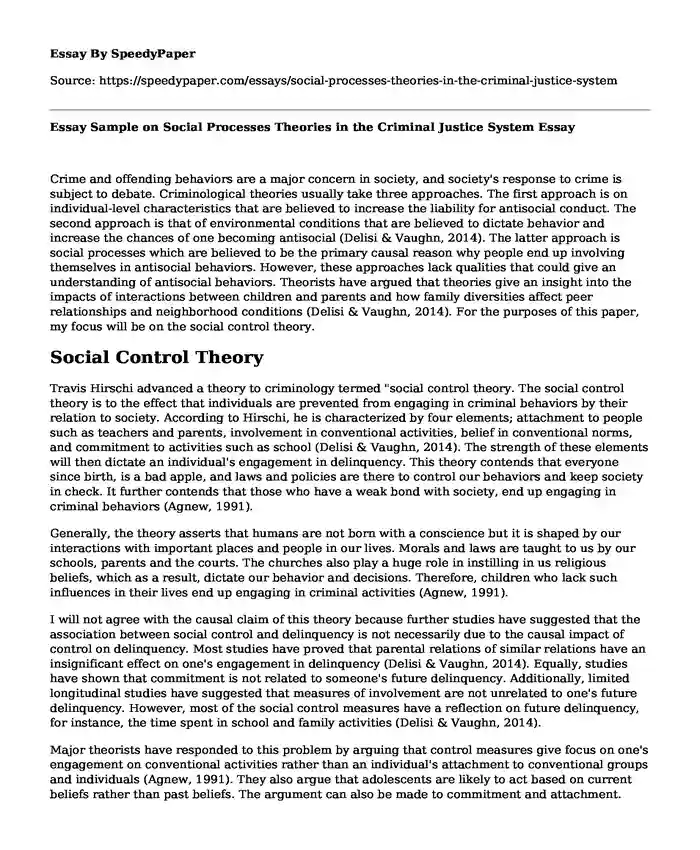
| Type of paper: | Essay |
| Categories: | Criminal justice Behavior Social responsibility |
| Pages: | 3 |
| Wordcount: | 634 words |
Crime and offending behaviors are a major concern in society, and society's response to crime is subject to debate. Criminological theories usually take three approaches. The first approach is on individual-level characteristics that are believed to increase the liability for antisocial conduct. The second approach is that of environmental conditions that are believed to dictate behavior and increase the chances of one becoming antisocial (Delisi & Vaughn, 2014). The latter approach is social processes which are believed to be the primary causal reason why people end up involving themselves in antisocial behaviors. However, these approaches lack qualities that could give an understanding of antisocial behaviors. Theorists have argued that theories give an insight into the impacts of interactions between children and parents and how family diversities affect peer relationships and neighborhood conditions (Delisi & Vaughn, 2014). For the purposes of this paper, my focus will be on the social control theory.
Social Control Theory
Travis Hirschi advanced a theory to criminology termed "social control theory. The social control theory is to the effect that individuals are prevented from engaging in criminal behaviors by their relation to society. According to Hirschi, he is characterized by four elements; attachment to people such as teachers and parents, involvement in conventional activities, belief in conventional norms, and commitment to activities such as school (Delisi & Vaughn, 2014). The strength of these elements will then dictate an individual's engagement in delinquency. This theory contends that everyone since birth, is a bad apple, and laws and policies are there to control our behaviors and keep society in check. It further contends that those who have a weak bond with society, end up engaging in criminal behaviors (Agnew, 1991).
Generally, the theory asserts that humans are not born with a conscience but it is shaped by our interactions with important places and people in our lives. Morals and laws are taught to us by our schools, parents and the courts. The churches also play a huge role in instilling in us religious beliefs, which as a result, dictate our behavior and decisions. Therefore, children who lack such influences in their lives end up engaging in criminal activities (Agnew, 1991).
I will not agree with the causal claim of this theory because further studies have suggested that the association between social control and delinquency is not necessarily due to the causal impact of control on delinquency. Most studies have proved that parental relations of similar relations have an insignificant effect on one's engagement in delinquency (Delisi & Vaughn, 2014). Equally, studies have shown that commitment is not related to someone's future delinquency. Additionally, limited longitudinal studies have suggested that measures of involvement are not unrelated to one's future delinquency. However, most of the social control measures have a reflection on future delinquency, for instance, the time spent in school and family activities (Delisi & Vaughn, 2014).
Major theorists have responded to this problem by arguing that control measures give focus on one's engagement on conventional activities rather than an individual's attachment to conventional groups and individuals (Agnew, 1991). They also argue that adolescents are likely to act based on current beliefs rather than past beliefs. The argument can also be made to commitment and attachment. Commitment and attachment refer to things that an adolescent loses by engaging in delinquency (Agnew, 1991).
In summary, the social control theory explains society's engagement in criminal behavior but it is not the only explanation. One could consider biological and psychological aspects to have a clear understanding of criminal behaviors in society.
References
Agnew, R. (1991). A longitudinal test of social control theory and delinquency. Journal of research in crime and delinquency, 28(2), 126-156. DOI: 10.1177/0022427891028002002
Delisi, M., & Vaughn, M. G. (2014). Foundation for a temperament-based theory of antisocial behavior and criminal justice system involvement. Journal of criminal justice, 42(1), 10 25. Retrieved from https://www.sciencedirect.com/science/article/pii/S004723513001116
Cite this page
Essay Sample on Social Processes Theories in the Criminal Justice System. (2023, May 07). Retrieved from https://speedypaper.net/essays/social-processes-theories-in-the-criminal-justice-system
Request Removal
If you are the original author of this essay and no longer wish to have it published on the SpeedyPaper website, please click below to request its removal:
- Mental Health Essay Sample: Integrated Care and Early Intervention
- Psychology Essay Sample on Behavioral Problems
- Essay Example. Type of Organization and How It Serves a Customer
- Paper Example. Deterrence Theory in Criminology
- Free Essay Example on Signals Intelligence (SIGINT)?
- Essay on Seeking Justice: Oppression in the Modern World
- Essay Example - Mendelsohn's Theory of Victimization and Victim Blaming
Popular categories




